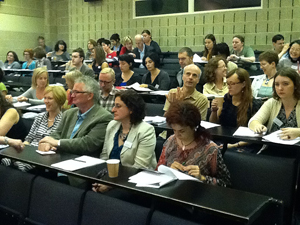Monitoring Parents: Science, evidence, experts and the new parenting culture
University of Kent, 13 and 14 September 2011
Organised by Parenting Culture Studies and the Kent Centre for Law Gender and Sexuality
This event was built around four keynote sessions that explored the development and expansion of the claim that there is reliable scientific evidence that can tell us the best way to bring up children, and that parents should take heed of what experts have to say when they disseminate this evidence. The focus for three of these sessions was the claim that ‘brain science’ in particular provides important new evidence that should shape child-rearing practices. The exploration of the issues in these keynotes included insights from history, philosophy, cognitive psychology, sociology, and social policy. The paper titles were as follows, and in the coming days and weeks you will be able to watch AV recordings by following the link below.
Keynote 1: Perspectives on the rise of parenting science
Janet Golden, Professor of History, Rutgers University,The Many Sciences of Parenting; Stefan Ramaekers, Centre for Philosophy of Education, University of Leuven, The claims of parenting: Reasons, responsibility, society; Frank Furedi, Professor of Sociology, University Kent,
Who is to Judge? The unresolved contradiction of the parenting expert
Keynote 2: Parenting and the ‘new phrenology’
Ellie Lee, Reader in Social Policy, University of Kent, Prejudice masquerading as research: brain science and British social policy; Glenda Wall, Associate Professor Sociology, Wilfred Laurier University, Canada, ‘Powerful cognitive engineers: The social positioning of mothers through brain development discourse’
Keynote 3: Distortions of Neuroscience
John T. Bruer, President of the James S. McDonnell Foundation in St. Louis,The Myth of the First Three Years; Stuart Derbyshire, Senior Lecturer in Psychology, University of Birmingham The Problem of Infant Neurodeterminism
Keynote 4: Special lecture
Raymond Tallis, doctor, retired clinical scientist and philosopher, author, Aping Mankind: Neuromania, Darwinitis and the Misrepresentation of Mankind
The remainder of the programme comprised more than 30 papers on a wide range of topics. You can see the programme and access materials about these papers by following the link below. You can also read a detailed write-up of the discussion at the event by CPCS Associate Jennie Bristow here
Overall, some key areas and problems emerged from our deliberations. CPCS seeks to work with others over the coming months to generate research ideas and plans for further events where these themes can be explored; if you are interested in collaborating with us get in touch by emailing Ellie Lee E.J.Lee@kent.ac.uk
● We need to understand more fully the process we can, for now, call ‘scientisation’ i.e. the way informal relations between parents and children have become thoroughly saturated with the language and vocabulary of science
● The nature of this language that is used to speak about this area of life need more exploration; its origins, mechanisms for diffusion into hitherto informal relations, and international similarities and differences
● Further exploration is needed of how the scientisation of childrearing is internalised by parents, and other adults, and what the effects of this aspect of the ‘intensification’ of parenting are
● We should devote energy to understanding the relation between the scientisation and individuation of parenting, and wider problem of the weakening of adult solidarity and of adult responsibility for the socialisation of the next generation (in this area exploration of Arendt’s concept ‘natality’ may prove fruitful)
● There is a need for more dialogue about, and clarification of, the differences between privacy and informality on the one hand, and individuation and formalisation on the other. We need more generally to develop new concepts that adequately capture the nature of the contemporary context and experience that improve on the term ‘neo-liberalism’
● The workings of the contemporary State in regards to parenting culture are an important area for theoretical and empirical work; the movement from the welfare state to the ‘therapeutic’ or ‘interventionist’ state is an important area to consider further, again in a comparative sense

